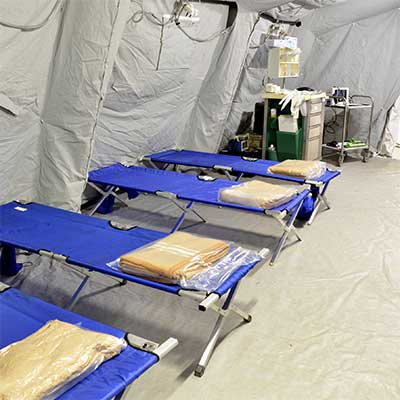When emergencies and disasters strike, first responders are there on the scene. However, after the initial response is over, there is another critical phase of emergency management known as mass care: when victims of the disaster are cared for and assisted.
In order to provide effective mass care, it’s important to understand what it is and how to prepare for it.
What Is Mass Care?
Mass care is the provision of necessary services to disaster survivors. While emergency caregivers and first responders provide first aid and life-sustaining medical services, there is more to disaster relief.
Mass care is the emergency support function that provides food, water, shelter, medical care, and other functional needs.
When Do You Need Mass Care?
Mass events can happen at any time and give no warning. Mass care facilities often need to set up quickly following an event to provide the best care possible. These situations often follow incidents where a significant amount of the area’s general population is affected, whether they’re displaced from their homes or separated from family members.
Some incidents that require mass care are natural disasters, extensive power outages, mass evacuations, public health emergencies, and mass casualty incidents.
Mass Care Preparedness
No one can anticipate when a mass incident will occur; that’s why it’s important to have a planned disaster response to help those in need and provide care as soon as possible. When mass care is needed following an incident, the Federal Emergency Management Agency (FEMA) and the American Red Cross can coordinate with local governments and volunteer organizations to set up mass care shelter facilities.
FEMA (fema.gov) is an ESF #6 agency (Emergency Support Function) that provides guidance and support to local jurisdictions on the provision of services with special considerations in sheltering and evacuation situations, including security, temporary housing, and other special needs. FEMA provides the National Response Framework (NRF) as a guide on how to respond to all types of emergencies and disasters.
Some non-profits may also have disaster assistance programs to aid following incidents. The National Voluntary Organizations Active in Disaster (VOAD) is a national support agency available to assist in the aftermath of a disaster. Following an event, additional mental health services may be needed for those who survived the disaster. Behavioral health and social services help survivors cope with the stress and loss caused by the event.
Mass Care Operations
One way to think about mass care services is as “human services.” Emergency care providers and first responders tend to the health care needs of those affected, while mass care focuses on the overall care of the disaster survivors. These mass care services often include the reunification of family members, feeding operations, and distribution of emergency supplies.
Reunification
It happens too frequently; when disaster strikes, people get displaced from their loved ones. This is most common with young children who get separated from their families. Reunification services work to help displaced disaster survivors make contact with their friends or family.
Until children can be reunited with their parents, the emergency shelter they are waiting in should provide adequate childcare.
The American Red Cross “Safe and Well” program is designed to help families reunite following a disaster.
Providing Meals
Providing food is one of the most basic support services needed following an emergency. Emergency assistance teams set up a variety of ways for people to receive meals, including fixed meal sites, mobile feeding units, and bulk distribution sites.
Distribution of Emergency Supplies
Providing property supplies to those in need is a crucial component of proper emergency response. Emergency services should include providing life-sustaining resources (i.e. food and water), hygiene supplies, and cleanup items to disaster survivors and evacuees.
Temporary Housing
Temporary housing shelter operations are crucial following incidents where multiple people are displaced or their homes are inhabitable. Emergency shelters are set up in large rooms with cots for evacuees to sleep. Temporary housing should provide shelter to the general population and accommodate people with disabilities and special needs. Temporary housing may need to allow service animals.
Depending on the situation, the local government might declare a citizen evacuation or shelter-in-place order. In these instances, temporary shelters must be available to evacuees or those without housing.
Emergency shelters should also have the ability to provide minor medical care.
Be Prepared With the Right Equipment
It’s impossible to know when a natural disaster or mass incident will occur, so you must always be prepared with proper emergency supplies and equipment for first responders and care providers.
The following list of items are crucial to providing support and resources in mass care scenarios:
Cots
Cots and beds should be used in emergency shelters and temporary housing for evacuees seeking refuge to have a place to sleep.
First Aid Kit
Most disaster assistance requires some type of medical care. Those with life-threatening or major injuries should go to a hospital, but others may only require minor medical services from that of a first aid kit.
Incident Command Vests
In an emergency operations center, vests help disaster survivors identify volunteers and medical staff. Incident command vests are color-coded to easily indicate the chain of command.
Emergency Blanket or Survival Wrap
Emergency blankets are used for disaster survivors who have extremely low body temperatures or are suffering from hypothermia. Some are even disposable to eliminate the risk of biohazards.
Mass Oxygen Delivery Systems
Mass oxygen distribution systems are able to provide oxygen therapy to multiple patients at once using one power source. These are critical in mass casualty events where many victims require oxygen.
Field Hospitals
Field hospitals allow paramedics and first responders to provide emergency care out in the field. Emergency response trailers are dedicated spaces to treat patients and store critical supplies.
Gauze
Medical gauze and dressings provide wound care to victims. Sterile and non-sterile options are available.
Disinfectants
With so many people sharing a space, it’s important to keep high-traffic areas clean from biohazards and bacteria. Regularly disinfect common areas and items with disinfectant to reduce any risk of illness.
Body Fluid Management
Depending on the incident, disaster survivors may be sick and need accessible body fluid disposable. Keep multiple options available to assist the individual needs.
Heat Packs
Heat packs can be used to provide heat therapy to injured victims or used as a small heat source to warm small parts of the body in emergency situations.
Cold Packs
Cold packs provide cold therapy to those with muscle strains or injuries. They can also be used by those with heat stroke to cool down.
Flashlights
Flashlights are a crucial part of emergency supplies, especially in the event of a power outage.
PPE
When caring for several people, be sure to protect yourself and your team with personal protective equipment (PPE). Wear sterile gloves, gowns, and face masks when needed to avoid biohazards.
Safety Suit
Mass care can be a result of a biohazard or pandemic. When a significant biohazard is present, it’s important to protect caregivers with the proper equipment, like safety suits, to avoid contact with hazardous material.
Burn Sheet Dressings
Burn dressings and burn gels are used to treat burns in the field.
Power Generators
Field hospitals, emergency response trailers, and shelters all require a power source. In some cases, they will need their own generator to guarantee power.
Find Emergency Supplies at Penn Care
Don’t just ask, “what is mass care?” Instead, start preparing for all emergencies.
All the supplies needed to provide emergency care are found at Penn Care! Search cot options, cot supplies, flashlights, first aid kits, PPE, and much more. Order online or call 1-877-387-9715 to order today!



